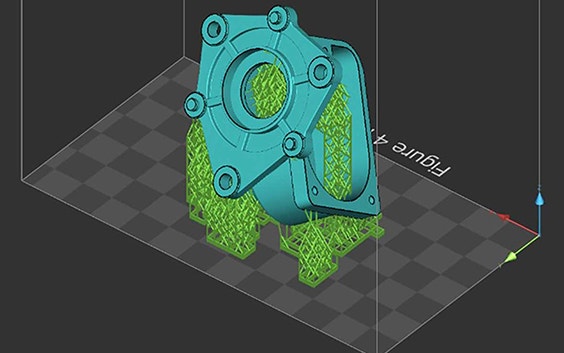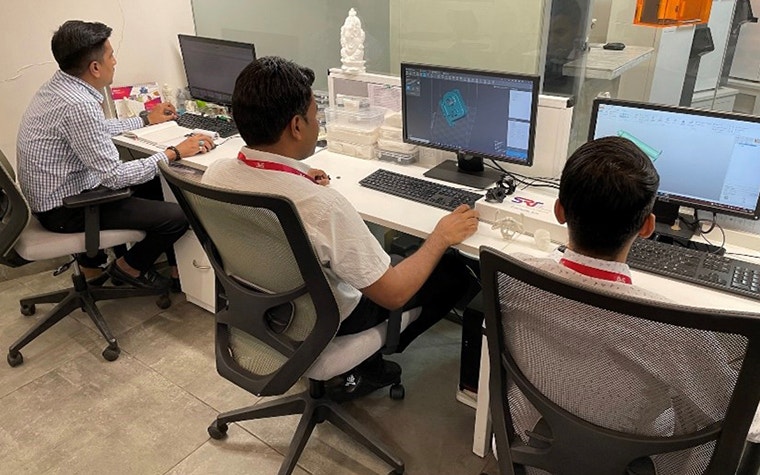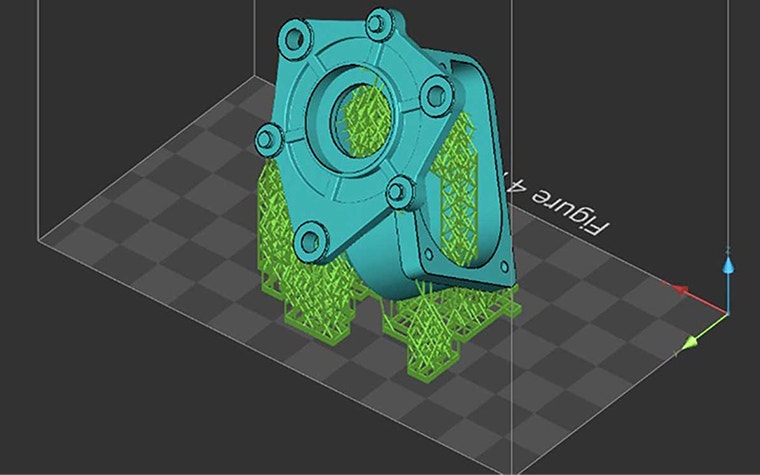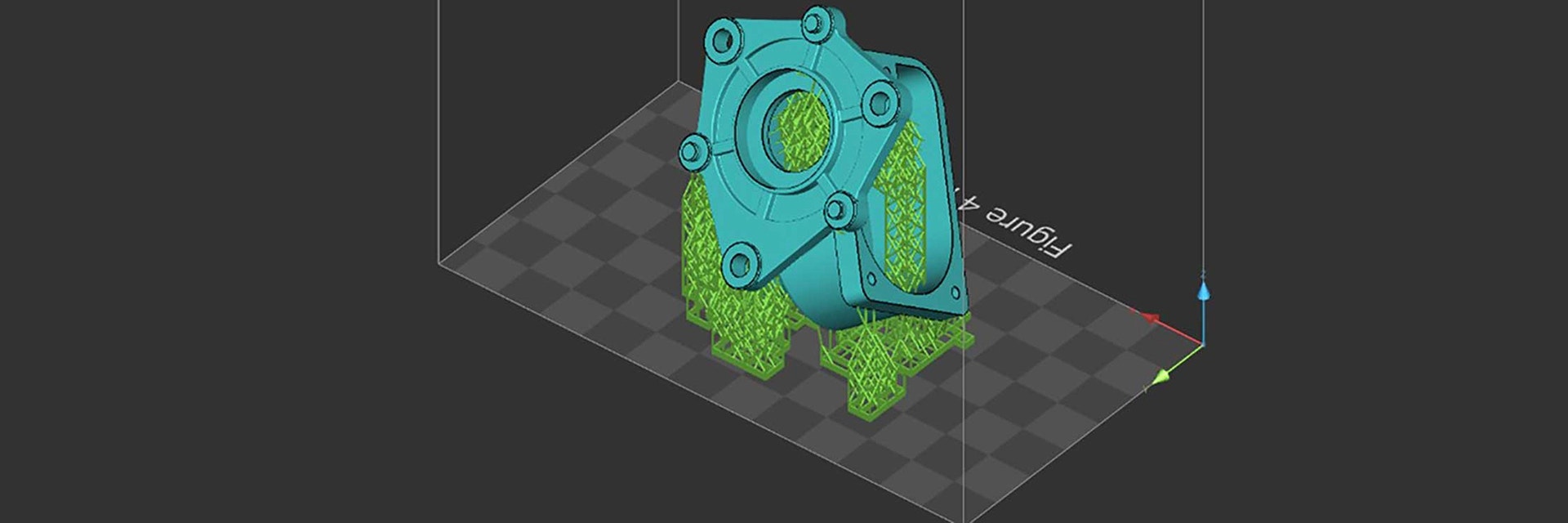CASE STUDY
The Power of Materialise e-Stage: Shree Rapid Technologies Reduces Resin Material Consumption for Support Generation by 50%

Time and skilled labor are precious resources that companies can ill afford to waste. But these factors affected Shree Rapid Technologies (SRT) when printing parts on their SLA and DLP machines. Previously, although support generation was automatic, the process needed to be cross-checked by trained engineers to ensure supports were generated correctly. These structures experienced occasional build crashes despite such inspections.
However, SRT managed to automate the process — thanks to Materialise e-Stage. The software’s algorithm and extensive parameter set reduced the material used for support structures by 50%, saving printing time. This eliminated crashes and resulted in considerable cost savings in terms of man-hours and material consumption.
Challenge
Reduce time and manual labor during support generation
Founded in 2007, SRT in Mumbai, India, is an industry leader in providing end-to-end solutions for digital workflows. The company’s expertise ranges from 3D scanning and reverse engineering to 3D printing and post-processing. With its unique customer innovation Center (CIC), SRT offers a variety of 3D printing technologies. And clients have the opportunity to gain hands-on experience with various processes, materials, designs, and applications in several industries.


The company prints 200 parts per week — mainly automotive pieces, consumer goods, and electrical fixtures — relying on a limited number of technical staff and equipment to meet demand. However, apart from dealing with urgent requests and projects requiring quick turnarounds, the company also experienced persistent challenges while working with its SLA and DLP machines. Specifically, labor-intensive support generation and the occasional build crash. This occurred when creating parts with free-forming surfaces, solid geometry, and designs with thin walls.
Their highly-skilled engineers and application specialists needed to manually assist with the support structures generated while printing, taking valuable time and resources. This underlying issue (combined with a steady stream of requests) led the team to adopt a different approach.
Solution
Automate support generation to improve build quality
Automation seemed like the obvious answer, but how would the company find a unique solution built for their requirements? Curiously enough, the answer was close at hand. SRT has been a loyal user of Magics for over a decade, but the company was yet to use Materialise e-Stage. This changed, however, when the company found out about e-Stage via a range of webinars, exhibitions, and word-of-mouth which gradually piqued their interest. Based on their general understanding of e-Stage, SRT decided to try out the software to evaluate its credentials.


They first used e-Stage when 3D printing jewelry patterns and quickly saw the benefits of using an automated solution. A Materialise application engineer tweaked the support parameters and optimized them based on the 3D printing technology, the resin’s properties, and part geometry. This helped automate support generation and ensured that all the builds were created successfully.
“Materialise e-Stage has reduced material usage, fully automated support generation, improved part quality due to reduced supports, and facilitated faster processing times.”
— Nitin Chaudhari, Partner at Shree Rapid Technologies
By the end of the evaluation, the team was convinced; e-Stage proved itself as the software of choice. This was due to its efficiency and huge time-saving capabilities — with the quality of the builds exceeding the team’s expectations.
Result
Automated support generation reduces time and material consumption
The fully automated process resulted in a 50% reduction in the materials consumed and a decrease in printing time by 10-15% compared to other OEM software. And, as multiple parameters can be set and optimized, the software also significantly reduced support generation and processing time.
The quality of the supports was vastly improved, too. The software helped facilitate consistent output requiring minimal finishing work, with support structures being generated only when needed. The needle-thin contact points make it easier to remove support structures. Plus, more reliable builds meant that crashes were significantly reduced on complex designs.
One such example was an order from a leading automotive company to 3D print prototypes of a dashboard and bumper. “For such builds, support generation was crucial due to the sheer size and complexity of the designs,” states Nitin Chaudhari, Partner at SRT.
e-Stage identified all the critical areas to apply the needle-like support points based on its superior algorithm. This was then further strengthened by a scaffold-like structure to sustain the weight of these large parts. As a result, the team delivered the 3D-printed parts (with the highest build quality) in record time — approximately 65-70 hours. This build success, a first that involved 3D printing large parts with such complex geometries, strengthens the software’s usefulness and importance to SRT.
“Materialise e-Stage has reduced our material usage, fully automated support generation, improved part quality due to reduced supports, and facilitated faster processing times. The software has helped us push boundaries, especially as supports are only generated where necessary, making the removal process far easier and faster. This reduces human error and the physical and time pressure placed on our engineers,” says Nitin.
Such results demonstrated the capabilities of e-Stage, but what surprised SRT the most was the cost-saving. Now, the company’s outcomes delivered end-products that took fewer man-hours to produce and resulted in substantial material savings.
SRT quickly implemented the software with other 3D-printed parts in different sectors, thanks to all these improvements. And SRT consistently uses e-Stage on DLP and SLA machines to create better benchmarks and prototypes for their clients. The software produced better results and helped the company make more reliable builds. In the future, SRT’s application team is planning to use e-Stage with their metal 3D printing and is exploring different build opportunities. But SRT is quietly confident that e-Stage can deal with any challenges that appear on the horizon.
Share on:
This case study in a few words
Resin 3D printing
Materialise e-Stage
Materialise Magics
Automated support generation
Reduced time, labor, and material consumption
Improved build quality
Design freedom
How we helped
Optimize and automate support generation with options tailored to different materials, technologies, and geometries.
Improve production efficiency, automate repetitive tasks, and optimize print success rates with industry-leading data and build preparation software.
